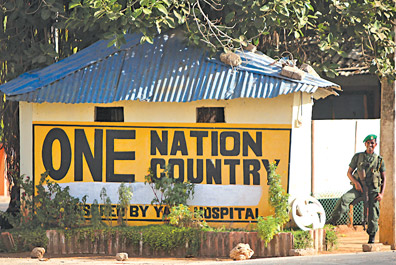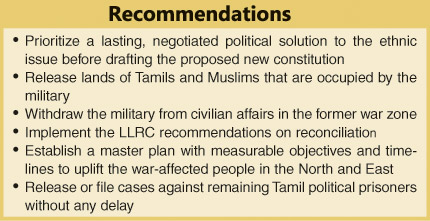|
Towards reconciliation:
Inching forward on thorny issues
Genuine reconciliation, which engages people and rebuilds greater
national unity, is one of the priorities of the new government. The
following is an exploration of the progress of reconciliation in Sri
Lanka from January to September 2015.
Dealing with the past
Marking Sri Lanka’s 67th anniversary of independence on February 4,
2015, President Maithripala Sirisena in his address to the nation
promised reconciliation. Immediately afterwards, in line with one of the
LLRC recommendations, a special peace pledge was delivered in all three
languages to respect all citizens of all ethnicities and religions, who
lost their lives in the war and were victims of violence since
independence.
|

A soldier stands near a public hospital -aljazeera |
During the previous regime, Independence Day celebrations were
excessively glamourized by the armed forces and failed to celebrate the
diversity of the country. This year’s celebrations marked a significant
difference indicating the shift of mindset within the government.
This shift of mindset can also be seen through the new government’s
effort to change 19 May –the day marking the end of the war and
previously celebrated as ‘War Heroes Day’ – to a ‘Remembrance Day.’
Former President Mahinda Rajapaksa, however, countered this effort by
maintaining his own public celebrations of a ‘War Heroes Day’ on 18 May.
New stance
Another example of this shift was the attempt was the lifting of the
unofficial ban on singing the National Anthem in Tamil. Even though in
practice, the Sinhala and Tamil versions of the National Anthem were
sung without restrictions in the past, President Rajapaksa placed an
unofficial ban on the singing it in Tamil in 2010.
In April 2015, talks were held in Singapore between various Sri
Lankan groups, including government politicians, Tamil political parties
and diaspora groups, to promote reconciliation and strengthen democracy.
This meeting was organized by the Government of Switzerland and a South
African-based organization.
Making 100 days of the new Presidency, the President stressed on the
necessity to promote brotherhood, friendship and coexistence among all
communities and to ensure the rights of all people. He also announced
that a Presidential Task Force and a Presidential Office for
Reconciliation have been set up.
After the 17 August Parliamentary Elections, the Secretariat for
National Unity was set up with former President Chandrika Kumaratunga as
its head. A Ministry of National Dialogue has been established under
former human rights activist and Member of Parliament, Mono Ganesan.
Demilitarization
Demilitarization of the North has since long been recognized as an
essential prerequisite for reconciliation: On the one hand, there has
been a strong demand from Tamil political parties to remove or to reduce
the military camps from the North and East. The new government has
categorically stated that it will not remove any military camps in the
country, especially from the North and East. The actual number of
military personnel stationed in the North and East of the country
varies, depending on the sources and interpretations, but it is clear
that disproportionately large military contingents are stationed in
these two provinces. Neither the military nor the government has
released any official figures concerning the military deployments in the
North and East. The reduction of number of military personnel stationed
in the North will remain one of the contentious issues towards achieving
genuine reconciliation.
 One step into the right direction was the replacement of the
ex-military governor of the North by a civilian governor. Although the
military has not yet been withdrawn and it remains engaged and present
in day-to-day life of Tamils in the North and East, the role of the
military in civil administration has reduced and the military and
intelligence forces seem to exercise less surveillance and intimidation
on the population in the North and East. Military-held land was also
released which can be considered as another step towards
demilitarization. One step into the right direction was the replacement of the
ex-military governor of the North by a civilian governor. Although the
military has not yet been withdrawn and it remains engaged and present
in day-to-day life of Tamils in the North and East, the role of the
military in civil administration has reduced and the military and
intelligence forces seem to exercise less surveillance and intimidation
on the population in the North and East. Military-held land was also
released which can be considered as another step towards
demilitarization.
On 28 August, the last remaining military check post on the A9
Highway was removed. The Omanthai checkpoint remained an iconic boundary
between the North and South of the country and since the end of the war,
security forces maintained the Omanthai checkpoint to register people
and vehicular movements.
Out of a total of 6382 acres of land occupied by the Army in
Valikamam North, about 1033 acres were released to the original owners.
However, concerns have been expressed over the manner in which land was
released: the former Land Commissioner of the Eastern Province expressed
that the land in the Northern Province was not released according to
proper procedures such as the issuing of a fresh Gazette notification
under Provision 39 (1) of the Land Acquisition Act, revoking the
previous seizures of the Rajapaksa regime. According to some reports,
44,548 acres of land is still under military occupation in the North and
East.
Following the release of land in Valikamam North, the Ministry of
Resettlement, Reconstruction and Hindu Religious Affairs held
discussions with the concerned population for the release of further
9000 acres in Jaffna and another 9000 acres in Mullaitivu.
A total of 816 acres of land in Sampur were taken over by the Army
during the war and vested in the Ecard of Investment (ECI) by a Gazette
notification issued by the then President Mahinda Rajapaksa and was
later handed over to a company named Sri Lanka Gateway Industries on a
99- year lease. This land was released by signing the relevant Gazette
notification, revoking the agreement and enabling over 7000 IDPs to
return. The Sri Lankan Navy also has agreed to relocate a camp covering
237 acres that was in the same proximity.
Resettlement
According to the Ministry of Resettlement, Reconstruction and Hindu
Religious Affairs, as of 30 June, some 75,901 families (275,639 persons)
in the Eastern Province and 157,051 families (521,081 persons) in the
Northern Province have been resettled. Some 14,828 families (50,268
persons) are yet to be resettled. Some of these families are living with
friends or relatives, but most of them are housed in 32 welfare centres
in Jaffna and three centres in Trincomalee.
A report of the Internal Displacement Monitoring Centre (IDMC) was
released in July 2015 estimating the number of IDPs at 73,700 –a figure
that is much higher than the government statistics.
To facilitate resettlement, the UNHCR has agreed to provide temporary
shelter in the form of a semi-permanent structure valued at US$ 1000 and
the government is to provide a resettlement allowance of Rs. 25,000 and
another Rs.13000 for clearing land, food and other contingencies.
The government has allocated a total of Rs.180 million for this
purpose. However, temporary shelters, water, transport, health and
educational services have so far not been arranged. Many still live in
make shift tents and huts and other merely visit their land during day.
Some of the re-settlers have been required to register with the
military, in addition to the usual registration process by the civil
authorities, such as the Grama Niladhari. The military has demanded
copies of all family documents and photographs for this purpose. Rent
for the years of occupation or compensation for loss of livelihood have
not been paid to anybody affected. In addition, the issue of the
displaced Northern Muslims, who were evicted in 1990, have not been
sufficiently addressed as of yet. The resettlement of the Northern
Muslim has been dragging for years, not only because of the
unwillingness of the State but also because of the complexity of the
issue.
Meanwhile, records indicate that currently 105,000 Sri Lankan Tamil
refugees are living in different camps and welfare centres throughout
Tamil Nadu, India. The Minister of Resettlement, Reconstruction and
Hindu Religious Affairs stated that they are welcome to return to Sri
Lanka and that all returning families are entitled to rehabilitation and
relief assistance.
Communal violence
Another challenge on the way to achieve meaningful reconciliation is
anti-Muslim violence. In June 2014, two individuals died, many were
injured and thousands were displaced in the town of Aluthgama. This was
considered as one of the worst outbreaks of sectarian violence in years.
Bodu Bala Sena (BBS), the Buddhist extremist group who led these
attacks and who had been spreading anti-Muslim hatred for a long period,
enjoyed immunity after this incident. After the regime change, the
influence of BBS has clearly reduced and in May 2015, the BBS General
Secretary was arrested on a court warrant.
He was later released on bail but it was made clear that at the very
least, this group would no longer enjoy the level of immunity as it had
in the past.
As hate speech has been one of the main intimidation tools used by
the Sinhala Buddhist extremists, the Cabinet has approved amendments to
the Penal Code to ban hate speech. Despite the decline of numbers of
incidents of hate speech and hate violence compared to last year,
outrageous incidents of hate speech in mainstream and social media
continued. Given that the extremist BBS failed badly in the General
Election, there is a possibility of these attacks to recede. In
addition, no investigation into the anti-Muslim riots and murders in
Aluthgama has taken place so far and no one has been convicted in
connection with the incident. Albeit the Sri Lankan Army had
reconstructed shops and houses damaged in the Aluthgama incident, the
residents have not received compensation for the damage to their
property.
Attacks against Christians also continue. Since January 2015, over 26
cases of hate speech violence against and intimidation of Christians
have been recorded. All these attacks are against smaller evangelical
prayer houses located both in Sinhala and Tamil dominated areas and some
of them are serious in nature.
Devolution
A maximum of devolution of power is an important pre-requisite for
reconciliation. This has been demanded by Tamils for decades and is
still the strongest demand by the minorities. The new government has
expressed that the resolution of the national question will be a key
priority. The United National Party, in its manifesto before the
Parliamentary Elections, promised maximum devolution to the regions
within a unitary constitution. Even though several months ago, the Prime
Minister was quoted saying: “We must have a political settlement and
move forward,” so far nothing has been done in this regard. The Prime
Minister has proposed to hold tripartite negotiations among the UNP, the
SLFP and the TNA to arrive at a political solution.
- Sri Lanka Brief
[Recommendations]
*Prioritize a lasting, negotiated political solution to the ethnic
issue before drafting the proposed new constitution
*Release lands of Tamils and Muslims that are occupied by the
military
*Withdraw the military from civilian affairs in the former war zone
*Implement the LLRC recommendations on reconciliation
*Establish a master plan with measurable objectives and timelines to
uplift the war-affected people in the North and East
*Release or file cases against remaining Tamil political prisoners
without any delay |

